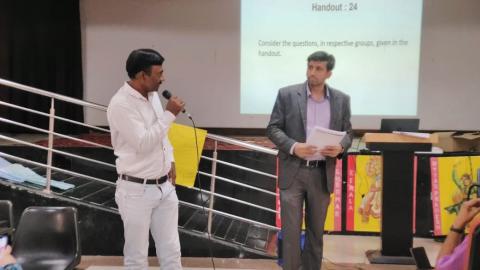
Is this what you ask?
As an educator have you come across these questions?
What is actually taught in schools?
What are the manifest and latent social functions of the knowledge that is taught in schools?
How do the principles of selection and organization that are used to plan, order, and evaluate that knowledge function in the cultural and economic reproduction of class relations in an advanced industrial society like our own?
What is the place of schools in maintaining the way economic and educational goods and services are controlled, produced, and distributed?
What schools do? Who succeeds? And who fails?
What is taken as knowledge, how accessible to different groups
any knowledge is, and what are accepted relationships between different knowledge areas and between those who have access to them and make them available?
What role does an educational system itself play in defining particular forms of knowledge as high status?
What shall be construed as knowledge?
What is considered legitimate knowledge?
What underlying meanings are negotiated and transmitted
in schools behind the actual formal ‘stuff’ of curriculum content?
What happens when knowledge is filtered through teachers? Through
what categories of normality and deviance is it filtered? What is the basic and organizing framework of the normative and conceptual
knowledge that students actually get? In short, what is the curriculum
in use?
What is the common-sense?
In whose interest do schools often function today?
What is the relation between the distribution of cultural capital and economic capital?
What if schools and the curriculum within them evolved in such a way that
the interests of my community were to be subsumed under the interests of more powerful people?
What if existing social and economic arrangements require that some people are relatively poor and unskilled and others are not?
Can we illuminate the political and conceptual tools needed to face the
unequal society in which we also live?
What is the latent role of the linguistic and logical structure of technical, efficiency, and ‘scientific’ perspectives in curriculum and in education in general? Who benefits from such perspectives? How do these categories and forms of consciousness serve as mechanisms of social and economic interest, when they are so clearly guided by the liberal urge to help? Are real, or abstracted, individuals ‘helped’ by these interests?
Whose knowledge is it? Why is it being taught to this particular group, in this
particular way? What are its real or latent functions in the complex
connections between cultural power and the control of the modes of
production and distribution of goods and services in an advanced industrial
economy like our own?
“What knowledge is of most worth?”
What is the relationship between culture and economy? How does ideology function?
Whose knowledge is it? Who selected it? Why is it organized and taught in this way? To this particular group?
How, concretely, may official
knowledge represent ideological configurations of the dominant interests
in a society?
How do schools legitimate these limited and partial standards
of knowing as unquestioned truths? These questions must be asked of
at least three areas of school life: (1) how the basic day to day regularities
of schools contribute to students learning these ideologies; (2) how
the specific forms of curricular knowledge both in the past and now
reflect these configurations; and (3) how these ideologies are reflected
in the fundamental perspectives educators themselves employ to order,
guide, and give meaning to their own activity.
Should schools, guided by a vision of a more just society, teach a particular set of social meanings to their students? Should they concern themselves only with
progressive pedagogical techniques, rather than espouse a particular social and economic cause?
How is this inequality made legitimate? Why is it accepted? As Gramsci would put it, how is this hegemony maintained?
Whose meanings are collected and distributed through the overt and
hidden curricula in schools?
How, then, do schools act to distribute the cultural capital?
What interests do schools serve, those of the parents and children, or
those of the teachers and headmaster? and ‘What wider interests
are served by the school? and, possibly more importantly, ‘How
do we conceptualize “interests” in social reality?’
For whom do schools work?
Whose cultural capital, both overt and covert, is placed ‘within’ the school curriculum? Whose vision of economic, racial, and sexual reality, whose principles of economic reality, whose principles of social justice, are embedded in the content of schooling?
AND
Where do I stand?
Note- All the questions have been taken from the book Ideology and Curriculum written by Michael W. Apple.
- Log in to post comments
